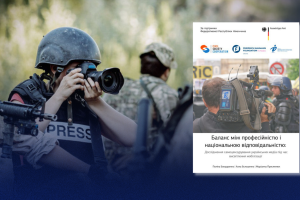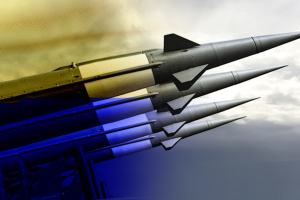This nationwide study was conducted jointly by the Ilko Kucheriv Democratic Initiatives Foundation and the Razumkov Center sociological service on June 13-20, 2019 in every Ukrainian region except for Crimea and occupied territories of Donetsk and Luhansk oblasts. 2,017 respondents were polled aged 18 and above. The theoretical sample error does not exceed 2.3%.
Funding for the nationwide survey was provided by the MATRA project of the Royal Dutch Embassy in Ukraine.
The results of earlier studies conducted by the Ilko Kucheriv Democratic Initiatives Foundation in partnership with the Razumkov Center and Kyiv International Institute of Sociology in 2016-2018 are available for comparison.
Only 17% of Ukrainians support establishing peace in Donbas by force. The greatest number of supporters of this option is among the residents of the West (28%) and the Center (16%), much less popular this option is in the South (8%) and East (13%). The majority of respondents (49%) believes that for the sake of peace, it is worth making compromises, but not all of them. This opinion prevails in all regions: Central (51%), Eastern (50%), Southern (48%), Western (44%).
''Peace at any price" is not supported by voters of any of the parties. Such option is the least popular among the voters of "Holos" (10%) and "European Solidarity" parties (7%). The biggest part of voters who support such option is among the supporters of "Opposition Platform - For Life" party (36.5%). But even among the supporters of this party the majority believes that for the sake of peace it is worth making compromises, but not all of them (44%).
Ukrainian citizens consider unacceptable most of the potential compromises discussed in the public space and envisaged by the Minsk agreements. The least acceptable for the citizens of Ukraine in all regions is conducting elections on the terms of militants (unacceptable for 66% of respondents, acceptable for 13%), a complete amnesty for all those who conducted military actions against Ukrainian troops (unacceptable - 61%, acceptable - 15%), the formation of law enforcement agencies in the ORDLO (“certain areas of the Donetsk and Luhansk oblasts”) only from local representatives (unacceptable - 58%, acceptable - 18%). Predominantly unacceptable for the population of Ukraine are amendments to the Constitution granting Russian the status of the state language (unacceptable - 54%, acceptable - 30%), special political and economic relations of temporarily uncontrolled territories with Russia (unacceptable - 53%, acceptable - 23%), adoption of the law on neutral and non-aligned status of Ukraine (unacceptable - 48%, acceptable - 29%).
Public opinion is divided on the issue of direct negotiations with the leaders of the self-proclaimed "DPR" and "LPR": for 41% of citizens it is acceptable and for the same number - 41% - unacceptable. The division of opinions has clear regional dimension: the idea of such negotiations is the most popular in the East (54% of citizens find it acceptable, 33% not acceptable) and in the South (68% and 20%, respectively). The attitude towards lifting the trade blockade and restoring trade with "DPR" and "LPR" is also ambiguous: 34% of Ukrainians consider such a proposal acceptable, 43% - unacceptable. However, opinions are also divided regionally: 52% of Ukrainians in the South and 47% in the East believe that lifting the trade blockade is acceptable (22% and 36% in the South and East respectively find this unacceptable). However, Ukrainians in the West evaluate the proposal to restore trade with "DPR" and "LPR" sharply negatively: only 15% consider such a proposal acceptable, while 54% - unacceptable. Negative attitudes prevail also in the Central region (acceptable - 32%, unacceptable - 48%).
The above-mentioned compromises are unacceptable for the majority of supporters of the main political parties, except for the voters of the "Opposition Platform - For Life" party. In particular, voters of this party consider it acceptable to hold direct negotiations with the leaders of "DPR" and "LPR" (75%). However, even supporters of this party do not appreciate all the possible compromises: for them as well as for the rest of the Ukrainian voters it is unacceptable to hold local elections in "DPR" and "LPR" on the conditions required by the militants (unacceptable for 45%, acceptable for 30%), the formation of the local police, courts and prosecutor's offices in the ORDLO exclusively from local representatives (unacceptable for 46%, acceptable for 30%), full amnesty for all those involved in military actions against Ukrainian troops (unacceptable for 43%, acceptable for 30%).
Regarding the future political status of the "DPR" and "LPR" territories, the majority of Ukrainian citizens prefer the option of returning the occupied territories on pre-war terms (54%). Another 17% want these territories to return to Ukraine, but with more independence from Kyiv. The option of autonomy for currently occupied territories within Ukraine is supported by only 12% of Ukrainians, and even in the East only 23% support the idea of the autonomy. It should be noted that the independence of these territories or their accession to Russia is supported by only 4%. The highest support of such idea is in the East, but it is only 8%.
The highest number of the supporters of the autonomy of the territories controlled by "DPR" and "LPR" is among the voters of "Opposition Platform - For Life" (31%), but even among the supporters of this party there is a prevailing opinion that these territories should either be returned to Ukraine on pre-war terms (35%) or with more independence from Kyiv (20%). The transformation of these territories into independent states or their accession to Russia is supported respectively by only 5.5% and less than 1% of the voters of the "Opposition Platform - For Life".
The introduction of the UN peacekeeping forces into the occupied territories of the DPR and LPR is supported by 55.5% of Ukrainians. 25% do not approve such an option and 20% are non-decided. There are regional differences on this issue: the highest support for the introduction of peacekeeping forces is observed in Western (74%) and Central (62%) regions, while in the Southern and Eastern regions there are mixed opinions: 38% of Ukrainians in the South support the introduction of peacekeeping forces, 34% do not; in the Eastern region 37% and 42% respectively. Among voters of the main political parties, only the voters of the "Opposition Platform - For Life" oppose the introduction of peacekeeping forces (32% of its voters support it, 50% do not support).








